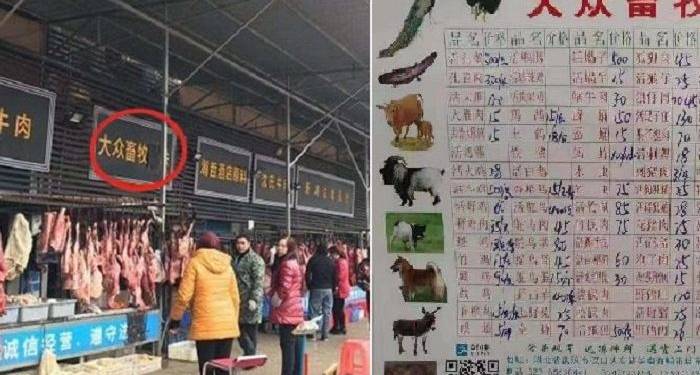As the coronavirus pandemic grips the world, it is safe to say that food habits in China have placed the entire world on the brink. The Wuhan virus is a direct resultant of China’s adventurous eating habits and Chinese laws which encourage the unholy mix of wildlife in its infamous wet markets.
Various experts have concluded that the zoonotic virus originated in Wuhan’s Huanan market in China as, of the first 41 cases of the virus, 27 of them had been to the wet market. In a sequence of events which mirror that of the 2003 SARS outbreak in China, the Chinese government closed the market under the pretext of ‘renovation’. The SARS coronavirus too originated in a similar wet market which spread to 29 countries and killed almost 800 people.
China has on an average about 80,000 flu deaths every year. The Wuhan wet market where the virus is believed to have originated is a place where a vast variety of live animals are slaughtered for consumption.
Experts believe that just like Ebola, the novel coronavirus COVID19 originated from bats. While the intermediate source is yet unknown, it is widely believed that the this novel coronavirus moved into pangolins from the bats and then finally to the humans. Viruses as deadly as this usually have a very narrow host range in terms of the species they can infect, and therefore this cross-over was possible only in a place like the Wuhan wet market, which is one of the rare places were bats, pangolins and humans are found at one place, thus resulting in the outbreak of the virus. Pangolins form an endangered species, illegally traded, and faces the risk of being eaten to extinction.
The menu of Wuhan’s wet market includes the likes of tiger, camel, snakes, rabbits, bats, bears, foxes and many more varieties of exotic wildlife. The wet markets of China were emboldened by the Communist Party’s decision in 1998 to term wildlife as “resources owned by the state” and protected people engaged in the “utilization of wildlife resources”.
With this law, an industry was born and just four years later, the SARS outbreak originated in a wet market in South China. When one connects COVID-19 with SARS, you have a simple fact – China refuses to take responsibility for its wet market business, illegal wildlife trade and refused to crack down on the wet market economy until the deadly outbreak of the virus.
While the Chinese government continues to maintain that the virus didn’t originate in Wuhan’s wet market, deep down it knows it is culpable and prone to such outbreaks if it doesn’t act against the wet market industry. In the wake of the epidemic, the Chinese government is now mulling a strict ban on the consumption and farming of wild animals.
“These animals have their own viruses,” said Hong Kong University virologist professor Leo Poon. “These viruses can jump from one species to another species, then that species may become an amplifier, which increases the amount of virus in the wet market substantially.”
However, the ban would be difficult to impose as China’s inherent cultural habits would be hard to change. During the SARS outbreak of 2003, the Chinese government banned the consumption of civets and killed them in large numbers after it was found that they likely transferred the SARS virus to humans. For a brief period even snaked were banned in the Guangzhou wet market. Fast forward to 2020, these species of animals are widely consumed in China and perhaps played a role in the transmission of the Wuhan virus.
Eating wild and exotic animals is considered to be a sign of status in China. The exotic animals like peacock and boars come at a steep price and treating someone with the wild animals is appreciated and is perceived as a mark of respect. To make matters worse, myths like by eating wildlife, one can absorb the animals’ physical strength and resilience are prevalent in the Chinese culture.
As of 2017, China’s wildlife trade was found to be worth more than $73 billion and over a million people were employed in the industry. Closing down or partially restricting the industry will hit the Chinese economy hard which is already on ventilator. The image-conscious Xi Jinping government might take decisions which look like it is acting against the wildlife industry, while simultaneously, allow the industry to bloom away from the prying eyes of the media.
In 1918, it was the Spanish flu which originated in northern China and led to one of the deadliest pandemics known to mankind killing over 50 million people.
It is widely believed that after some months of laying low, the wet markets will bounce back as the demand would yet again increase thus making the nation and subsequently the world more vulnerable to epidemics like SARS and Wuhan virus.





























